
Related
With President Obama scoring a decisive re-election and progressive-backed ballot measures and candidates faring generally well nationwide, journalist John Nichols argues that the 2012 election provided not just a mandate for the Obama administration and the Democrats, but for progressive policies. A political writer for The Nation magazine, Nichols’ latest article is “For Obama, a Bigger Win Than for Kennedy, Nixon, Carter or Bush.” [includes rush transcript]
Transcript
AMY GOODMAN: To talk more about President Obama’s re-election, we are joined in Madison, Wisconsin, by John Nichols, political writer for The Nation magazine. His latest piece, “For Obama, a Bigger Win Than for Kennedy, Nixon, Carter or Bush.”
Take it from there, John.
JOHN NICHOLS: Well, I think that’s the thing that people have to wrap their head around. And I’m not just talking about Karl Rove running around in the studio at Fox trying to figure out why all of his hundreds of millions of dollars went awry. I’m talking about progressives, and indeed President Obama himself. So much of this election was framed on the notion that if President Obama was re-elected, he would sort of have to claw his way to victory, and it would be a very narrow thing, up all night with it—probably when we spoke on a Thursday morning after the election, we’d still be uncertain of the results. That’s not the case. When all the votes are counted, President Obama will have won a popular vote margin of more than three million, probably quite a bit more than three million. And when Florida is finished—it’s a mess down there, but when it’s finally counted, probably to his column he will have roughly 332 electoral—it looks like 332 electoral votes.
Those victories—more than three million popular vote, 332 electoral votes—are bigger than what John Kennedy came in with, bigger than what Richard Nixon came in with, bigger than what Jimmy Carter came in with, and bigger than what George Bush had in 2000 or what George Bush had in 2004. And I’ll remind folks that after that 2004 election, George Bush stood before the American people and said he put his platform out there, the people had embraced it, and he had political capital to spend. I think it’s very, very vital that President Obama understand that he has not scraped his way to victory here. He has got a win, and he ought to take that populist language, that progressive language of the close of his campaign, and make it much more central to his politics.
Unfortunately, this president has far too much of a tendency to compromise, and so that’s why the second part of the equation is progressives need to take this in. Progressives need to understand that they should pressure this president to respond to what can genuinely be referred to as a mandate to make sure that Social Security, Medicare and Medicaid are protected, to do humane and genuine immigration reform, as Juan has so well discussed, to do tax reforms that really do shift the burden to the wealthy. All of these things can be central to a program, but it can’t work if the president, and even the president’s supporters, think that he just narrowly won an election.
AMY GOODMAN: So, let’s talk about this issue of a mandate for President Obama. But first I want to go to Fox contributor Charles Krauthammer’s opinion on the matter. He spoke on Fox News election night.
CHARLES KRAUTHAMMER: If he gets a majority of the popular vote, it’ll be very small, if there’s any. And even in the Electoral, I think it’s going to be a rather small majority, particularly if Virginia, Florida will go to Romney. So this is not a mandate either with the numbers or in the way that he campaigned. He did not campaign on any ideas, anything large, anything important. He didn’t address entitlements or tax reform, anything like that.
So what would he do? I think he’s got—he will go back to who he is. People have said he should be a Clinton and compromise, have a successful second term. But he is not instinctively a moderate. I think he is a man of the left, and he will try to push his agenda through with what he thinks is a mandate. And I think we are going to be exactly where we were, say, a year ago with the debt ceiling argument next year. And the problem is that the country will slide right through a second term, because I don’t see give on either side, particularly with a president with a very weak mandate for a second term.
AMY GOODMAN: That was Fox contributor Charles Krauthammer, and it’s been widely reported that President Obama, after his victory, tried to call John Boehner, the House speaker, and as well as Senator McConnell, the Senate minority leader, and both said they were sleeping, they couldn’t talk.
JOHN NICHOLS: Well, I mean, this is really a big theme of the Republican right and their media echo chamber. And that is that this election was, as Haley Barbour, the former governor of Mississippi, former RNC chair said, pretty close to a tie. And they love that concept that President Obama just narrowly won. Again, I emphasize, sometimes elections are best understood a day later or even two days later. You know, Washington state out on the West Coast is still in the process of counting votes. They’ve only counted about 57, 58 percent of their vote. That’s a very Democratic state that is still piling on popular votes for Obama.
Now, I don’t want to sit with you, Amy, and suggest that President Obama is some perfect progressive. I don’t actually believe Charles Krauthammer at all when he says that Barack Obama is a man of the left. He may well have read many of the books of the left. He may have met many of the people of the left. But my sense is that Barack Obama is a centrist, has tended to be a very centrist president, and troubling, frankly, on a number of military issues as well, frankly, even on the entitlement reform debate, where he’s often been too soft.
What I want to emphasize here is, this president went before the American people, and the election was framed very much as a referendum on austerity, as a referendum on cuts to Medicare, Medicaid, Social Security, to a real radical reshaping of the country, as pressured by, as emphasis by, as outlined by Paul Ryan, the Republican vice-presidential nominee. The important thing to understand is, American people understood that choice, and they voted for Barack Obama. They also voted for two more Democratic senators. The Senate is going to be much more progressive than it was in the last session. In the states, they’ve elected at least six Democratic governors, potentially a seventh if Jay Inslee wins out in Washington state. And they’ve shifted state legislatures—in the state of Maine, going from a Republican-controlled Legislature now to a very Democratic Legislature to push back against their anti-labor governor; New York state, a legislative shift; many others.
Bottom line here is, in this election that was framed as, in many ways, a choice on austerity at the national and state level, people rejected it. It is very important that it be understood that this wasn’t a too-close-to-call election. President Obama has a mandate from the American people to push back against a right-wing economics. And he really must. The problem is that I’m not sure he will do that. I’m not sure he will take that in sufficiently. And I’m most concerned, perhaps, that progressives will not fully recognize that, that they have a power to make real demands on this president. I was in a union hall on election night, in Teamsters Local 20 hall in Toledo, Ohio. These trade unionists—African Americans, Hispanics, white working-class folks—when the news came, the president of the local union announced, “Brothers, sisters, our president of the United States has been re-elected.” They understood what that meant. To them, that meant a pro-labor, pro-public-education, pro-public-services president of the United States. Obama should serve as that. And those who elected him, that coalition that elected him, should make that demand on him.
AMY GOODMAN: Let’s talk about the other power. You’ve got organized people and then organized money.
JOHN NICHOLS: Yeah.
AMY GOODMAN: Can you talk about referenda on Citizens United around the country, John?
JOHN NICHOLS: Yeah, it’s really exciting. You know, one of the things that a lot of, again, the sort of punditocracy will tell us is that this is an election that showed you can beat money; big money doesn’t really matter; Karl Rove today is going to have to have some sort of conference call where he explains to all his billionaires why things didn’t work out as well as he had told them it would. And that can be very reassuring in one sense: we could tell ourselves, well, you know, look, boots on the ground did do better. And it’s true that there were many elections this year where candidates who had less money won elections. But the bottom line to understand is—and Sherrod Brown will you this, Bernie Sanders will tell you this, Tammy Baldwin will tell you this—candidates who won races had to spend six, seven, eight hours some days on the phone begging for money. This money in politics problem is a crisis. It is a crisis no matter what the final result. You may be able to claw your way to victories, but don’t think it isn’t a real problem.
And the people understand that. In the state of Montana, in the state of Colorado, they had referendums on whether those states should encourage a constitutional amendment to overturn Citizens United. And the results are very, very encouraging. Not just in those states, but in cities across the country, people voted to overturn Citizens United. And there’s a very exciting result out of Montana, as well. It looks like the new governor of Montana, Governor Bullock, a Democrat, will—you know, he’s a guy who was, as attorney general of Montana, the person who went to the Supreme Court and fought to maintain Montana’s historic bar on corporate money in politics. We have elected people who really do understand that we’ve got to overturn Citizens United. And we also—I think it’s very important to recognize, in this new Senate, Bernie Sanders made overturning Citizens United a central theme of his re-election campaign in Vermont—overwhelmingly won. Sherrod Brown put overturning Citizens United at the front of his agenda in Ohio; he won big. Tammy Baldwin, a big supporter of a constitutional amendment, and even Angus King, the new senator from Maine, a supporter of what can properly be described as aggressive, even radical, responses to money in politics. We ought to embrace this and make this a central theme of the next few months. This ought to be a movement that grows, because it’s clear, people want the change.
AMY GOODMAN: One of the closely watched Senate races was Montana, where voters ultimately decided to re-elect Democratic Senator Jon Tester. This is a part of his acceptance speech Wednesday morning.
SEN. JON TESTER: It is an honor to accept your trust in sending a Montana farmer with Montana values back to the United States Senate. Today—today ends in a historic election in Montana. Literally tens of thousands of TV commercials, radio ads, fliers in the mail, many of them from big corporations who spent millions of dollars trying to buy Montana’s votes. This victory is our victory, because it proves that neither corporations nor billionaires can buy the state of Montana and buy elections.
AMY GOODMAN: That’s the Democratic Senator Jon Tester, who will go back to the Senate. And there were a number of firsts, John—and we only have 30 seconds. I mean, in your state, you’ve got Tammy Baldwin, who will be the first openly gay senator. She is from Wisconsin and the first woman senator from Wisconsin. And then there’s Mazie Hirono, elected in Hawaii, becoming the first Asian-American woman elected to the Senate, the first woman elected from Hawaii in the Senate, and the Senate’s first Buddhist, as well as the first U.S. senator born in Japan—and, in fact, she was born in Fukushima, Japan.
JOHN NICHOLS: These are incredible stories coming in. And don’t forget Heidi Heitkamp up in North Dakota, in a state that voted overwhelmingly for Mitt Romney, a populist Democrat who put together the old urban-rural coalition. We had a lot of good politics that occurred on November 6, and we ought not to rush beyond it. We ought to look at some of these people who beat corporate power, beat big money, and we ought to recognize that there’s a cry out there from America for a different and better politics.
AMY GOODMAN: Well, John, I want to thank you very much for being with us. John Nichols, political writer for The Nation, author of Uprising: How Wisconsin Renewed the Politics of Protest, from Madison to Wall Street. And Democracy Now! of course covers movements, and so we will be covering the movements that make a difference in this next term of President Obama.


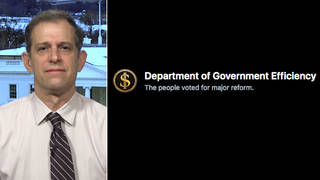
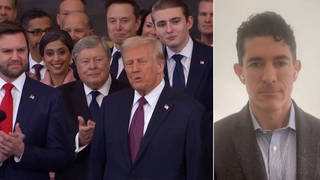
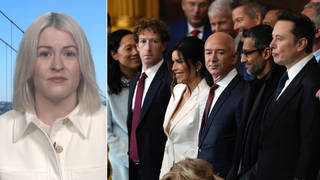





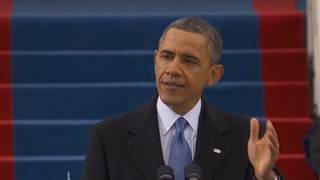
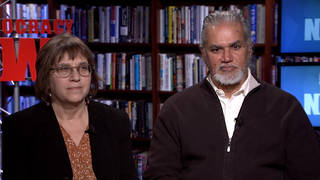
Media Options